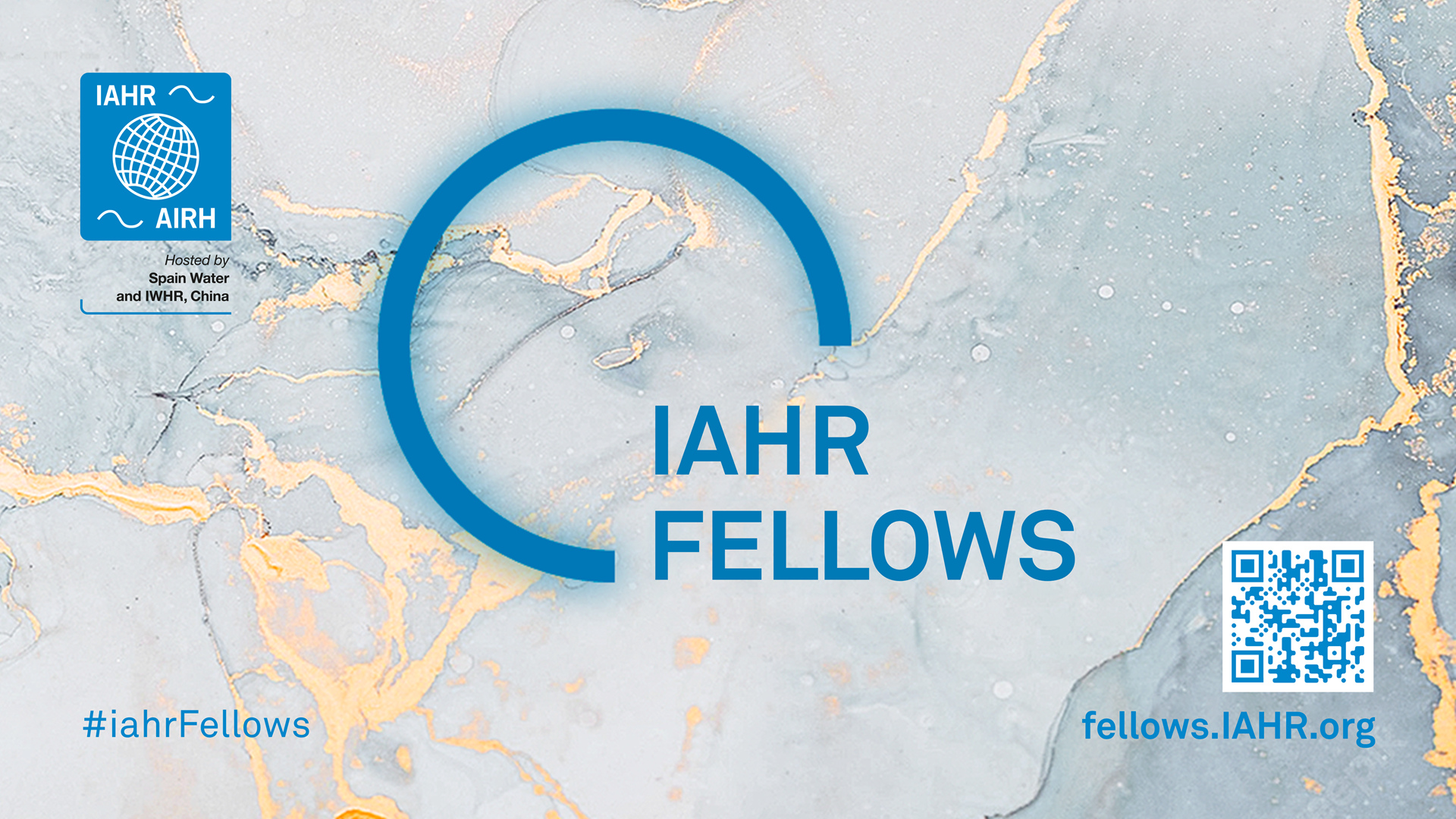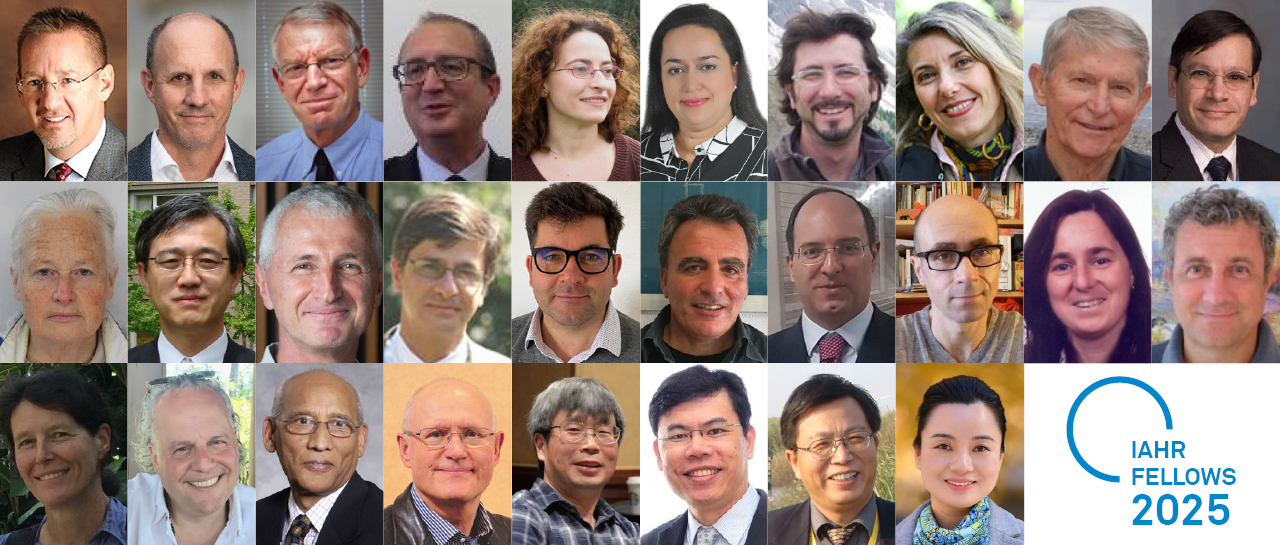IAHR Fellows

Recognising long-standing members with outstanding contributions to hydro-environment engineering and research.
IAHR seeks to recognise long-standing members who have made a significant contribution to the development of IAHR and in particular to the fields represented by the association.
The ultimate goal of the IAHR Fellows, a new membership category launched in 2022, is to recognise the impact of particular IAHR members on the hydro-environmente engineering profession and sector.
Who can be recognised as an IAHR Fellow?
IAHR Fellows should be visible and competent members of IAHR who represent the association with their expertise, represent it on relevant occasions, and identify themselves as IAHR Fellows.
IAHR Fellows should have made a contribution to sustainable development, the optimisation of global water resources management and flow processes and should be distinguished as an educator, practitioner, utility manager, regulator, researcher, engineer, scientist, or technical leader. Contribution by service directly to IAHR or its regional divisions will also be considered.
At the time of the nomination, the nominee must have been an IAHR member for a period of 15 years or more, including the year of evaluation.
Self-nominations are not accepted.
NOTE: An IAHR Fellow can be awarded the IAHR Honorary Membership Award. The IAHR Fellows membership category and the IAHR Honorary Membership Award are not mutually exclusive.
Who can nominate?
Any IAHR member can nominate any other IAHR member.
Required nomination documents
1. A nomination letter
Nominators should submit a meaningful nomination letter addressing the particular merits of the nominee. The letter should be written on letterhead (if applicable) and include the nominator's name, title, institution, and contact information. The nomination letter should not exceed 2 pages in length.
2. Supporting letters
Two distinct and unique supporting letters from IAHR members are required. Supporting letters may not be from members employed at the same organisation as the applicant. Each letter of support should be no more than 2 pages in length.
3. A statement by the nominee
The nominated member must also provide a statement affirming that they agree to be nominated for the fellowship and their intention to continue contributing to the Association through their work as an IAHR Fellow. They must also include a listing of their past participation in specific IAHR-related activities (one of the most important criteria being considered).
4. Nominee’s Curriculum Vitae
The CV must list all the following candidate information: name, mailing and email address, employment history, educational background and degrees, professional qualifications, relevant honours, memberships, service to the community.
The CV should not exceed 5 pages in length.
Points to note
Please send all required documents to fellows@iahr.org with the subject line: IAHR Fellow Nomination.
Please submit all required documents as unencrypted, watermark-free PDFs.
Please submit all documents in the English language and use an appropriate font size/type (e.g., Times New Roman, size 12).
Incomplete submissions will not be accepted.
What do we expect from IAHR Fellows?
We expect that an IAHR Fellows will continue to support IAHR in its activities, contribute to the growth of the network, motivate other members to become actively involved in IAHR and contribute to congresses, conferences, and events.
IAHR Fellows must adhere to the highest ethical standards of professional work and comply with the IAHR membership code of conduct.
Who selects IAHR Fellows?
The membership committee is responsible for the pre-selection of eligible nominees.
Unanimous decision of the Executive Council (EC) and a two-thirds majority of the Council approve the IAHR Fellows. The Fellows are presented and honoured at the biennial IAHR World Congress.
No more than 3 per cent of the current IAHR individual members can hold the status “Fellow”. When selecting Fellows, great importance is given to ensuring that the diversity of IAHR is represented. This applies to both gender and regional distribution.
2025 edition: Key dates
7 May 2025: Deadline to submit nominations.
22-27 June 2025: 2025 IAHR Fellows to be announced at the 41st IAHR World Congress.
Membership fee
IAHR Fellows have the same membership fee rate as other membership types:
Age < 65: 105 euros (50 per cent off for those from low-income countries)
Age ≥ 65: 53 euros (50 per cent off for those from low-income countries)
List of IAHR Fellows
IAHR Fellows 2025 were honoured at the 41st IAHR World Congress in Singapore on Thursday 26 June 2025 (ordered by first name):

Blake P. Tullis, Utah State University, USA
Brett Sanders, University of California, Irvine, USA
Bruce W. Melville, University of Auckland, New Zealand
Bruno Brunone, The University of Perugia, Italy
Claudia Adduce, Roma Tre University, Italy
Dalila Loudyi, Hassan II University of Casablanca UH2C-Faculty of Science and Technology, Morocco
Daniele Tonina, University of Idaho, Centre for Ecohydraulics Research, USA
Donatella Termini, University of Palermo, Italy
Eric Lesleighter, Australia
Fabian A. Bombardelli, University of California, Davis, USA
Guinevere Nalder, New Zealand
Hitoshi Tanaka, Tohoku University, Japan
Hubert Chanson, University of Queensland, Australia
Jorge Matos, Universidade de Lisboa, Portugal
Mario J. Franca, Karlsruhe Institute of Technology, Germany
Orazio Giustolisi, Technical University of Bari, Italy
Roberto Gaudio, Università della Calabria, Italy
Rui M. L. Ferreira, Instituto Superior Técnico, Universidade de Lisboa, Portugal
Sandra Soares-Frazão, Universite Catholique de Louvain, Belgium
Stefano Pagliara, University of Pisa, Italy
Susan Gaskin, McGill University, Canada
Tobias Bleninger, Federal University of Paraná, Brazil
Vijay P. Singh, Texas A&M University, USA
Vladimir Nikora, University of Aberdeen, UK
Weiming Wu, Clarkson University, USA
Wing Keung, Adrian Law, National University of Singapore, Singapore
Yangwen Jia, China Institute of Water Resources and Hydropower Research (IWHR), China
Yujun Yi, Beijing Normal University, China
IAHR Fellows 2023 were, for the first time, honoured at the 40th IAHR World Congress in Vienna, Austria on Thursday 24 August 2023 (ordered by first name):

Adri Verwey, FloodConsult, Netherlands
Corrado Gisonni, Università della Campania 'Luigi Vanvitelli', Italy
Damien Violeau, Electricité de France, Division R&D, France
Francisco Taveira Pinto, Faculdade De Engenharia Da Universidade Do Porto (FEUP), Portugal
Gregory De Costa, Open Polytechnic of New Zealand, Sri Lanka
Harindra Joseph Fernando, University of Notre Dame, USA
Jianhua Tao, Tianjin University, China
José María Grassa, Centre for Harbours and Coastal Studies from CEDEX, Spain
Marian Muste, IIHR - Hydroscience & Engineering, The University of Iowa, USA
Michele Mossa, Polytechnic University of Bari DICATECh, Italy
Mohamed S. Ghidaoui, The Hong Kong University of Science and Technology, Hong Kong SAR, China
Philip Roberts, Georgia Institute of Technology, USA.
Silke Wieprecht, Institute for Modeling Hydraulic and Environmental Systems, Stuttgart University, Germany
Somendra Kumar Mazumder, India
Subhasish Dey, Indian Institute of Technology Jodhpur, India
Sung-Uk Choi, Yonsei University, Republic of Korea
Vallam Sundar, Indian Institute of Technology (IIT), India